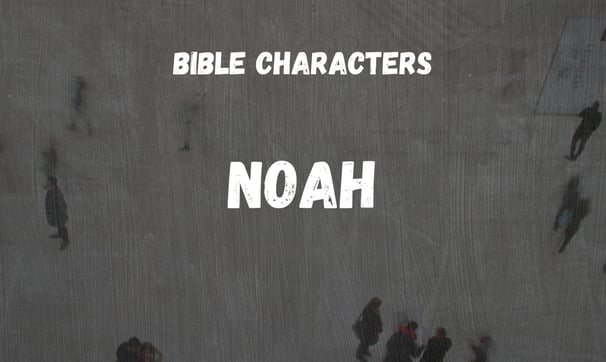Noah: The Righteous One in the Age of the Flood
BIBLE CHARACTERS


Noah preached and announced the flood for 120 years and yet only he and his family entered the ark.
“But Noah found grace in the eyes of the Lord. These are the generations of Noah: Noah was a just man and perfect in his generations, and Noah walked with God.”
Genesis 6:8-9
Noah played a crucial role in one of the most significant stories in the Bible, known as the man chosen by God to preserve humanity and creation during the Flood. His story, narrated in Genesis 6 to 9, highlights his faith, obedience, and central role in fulfilling God's divine plan. Noah was a direct descendant of Adam through the lineage of Seth, the son of Lamech and the grandson of Methuselah. Lamech named him Noah, meaning "rest" or "relief," expressing the hope that he would bring comfort from the suffering caused by the curse on the earth (Genesis 5:28-29). He had three sons: Shem, Ham, and Japheth, who assisted him in his mission.
Noah lived in a time when humanity had become extremely corrupt. Violence and wickedness filled the earth, and God decided to bring a universal judgment in the form of a flood. However, He chose Noah as the instrument of preservation for His creation (Genesis 6:5-8). Noah is described as "Noah was a just man and perfect in his generations," and someone who "walked with God" (Genesis 6:9). Because of this, God instructed him to build a great ark out of cypress wood, with precise dimensions and compartments to house his family and the animals (Genesis 6:14-16).
The ark was 300 cubits long, 50 cubits wide, and 30 cubits high, which translates to approximately 135 meters (450 feet) in length, 22.5 meters (75 feet) in width, and 13.5 meters (45 feet) in height. Additionally, God commanded Noah to gather a pair of each animal species, along with sufficient provisions for the survival of all during the flood (Genesis 6:19-21).
When Noah was 600 years old, the floodwaters covered the earth. The rain lasted for 40 days and 40 nights, but the waters prevailed for 150 days (Genesis 7:11-12, 24). During this time, the ark floated on the waters, preserving Noah, his family, and the animals. After the flood, the waters began to recede, and the ark came to rest on the mountains of Ararat (Genesis 8:4). Noah sent out a raven and later a dove to check if the land had dried. When the dove returned with an olive branch, Noah knew that the earth was becoming habitable again (Genesis 8:6-12).
After the flood, Noah built an altar and offered sacrifices to God, who accepted the offering and promised never to destroy the earth with a flood again (Genesis 8:20-21). God established a covenant with Noah, symbolized by the rainbow, ensuring the continuity of life on earth (Genesis 9:12-17).
Noah lived for 950 years, being one of the last antediluvian men to have extraordinary longevity (Genesis 9:28-29). He is remembered as an example of faith and obedience. His story is referenced in the New Testament as a symbol of salvation and divine judgment (Hebrews 11:7, 2 Peter 2:5). He is also considered an ancestor of all humanity through his sons Shem, Ham, and Japheth.
